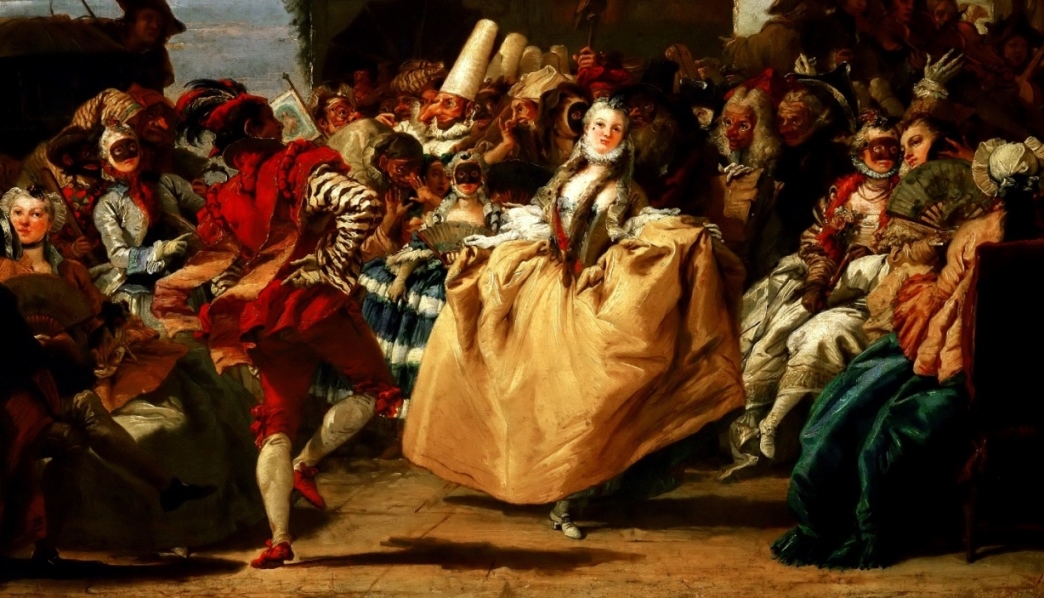The rustic minuet’s small step
has since been swept away
by all the modern pop and pep
and fizzle of the day.
One of the first to introduce
it into music’s lair
was Frenchman Jean Baptiste Lully
of Louis’ court and care.
That king first danced it at one of
his famous, fancy balls.
Of it he could not get enough
within his brilliant walls.
He liked its bows, he liked its glide,
he liked its many steps,
to front, to side, to back, to slide
in graceful, gentle sweeps.
In suites it took its place between
the sarabande and gigue,
with countless variations seen
so it would not fatigue.
So as the 18th century
proceeded on apace,
though many dances left the scene,
it found a humble place
within sonatas and,
in classic music keys
of Haydn’s, Mozart’s, Schubert’s and
Beethoven’s, symphonies.
So, though it’s rarely danced anon,
it managed thus to stay
because of who it chanced upon
as it went on its way.
Featured Image: “The Minuet or Carnival Scene” by Giovanni Domenico Tiepolo















On Small Things
I would like to comment a little on a poem I recently read—Ballad by U. Carew Delibes, first negatively, and then less so.
First, I really didn’t like the title of the poem. Certainly the author could have come up with a better title. I think Le Menuet would be an improvement, indicating its subject and its French derivation. Another thing I found a bit disconcerting was the comma at the end of the first line of the second-to-the-last stanza. I suppose the poet wanted there to be a pause at that point, but could he not come up with a better way? But the thing I least liked was his use of anon at the end of the first line of the last stanza. Although the word is an old, small word, its meaning doesn’t really fit in its context. I wonder that Delibes’ inspiration was flagging on the dismount.
On the other hand, I did not dislike his use of the third adjective small in the first line of his poem for several reasons. As to its being the third adjective in such a short line hardly matters to me at all. First off, it is particularly dangerous in writing to make a hard and fast rule about writing. Rules, after all, are meant to be followed and broken, as Shakespeare and Milton so convincingly demonstrated in their poetry; and this particular rule I ‘ve never seen advocated in the ballad form. With only eight parts of speech, however, it is interesting for me to note why an author emphasizes one part of speech. Why does he do this right at the beginning? I notice that Delibes also uses three adjectives in the third line of his penultimate stanza. Perhaps of more interest is his use of various nouns: mono-and-poly-syllabic, proper, etc. Note his use of four infinitives in line three in the fourth stanza. But the main reason I do not object to his use of small in the first line is that I suspect he is subtly pointing out that the wotd menuet, from Old French, actually means small.
What I liked most about this flawed, albeit exquisite, work were its knowledge, the alliterative link between Lully and Louis, the simple diction intertwined with a rich musical vocabulary, and its surprising central theme. All in all, for a ballad of eight stanzas, it delivers, if not a brilliant masterpiece, at least competent punch, sadly absent from most New Millennial poetry.
That’s a genuinely impressive answer.
Hello from poet/artist Mark Fee in Billings, Montana. My poetry (published Seattle, Bay Area/CA has gained momentum; compared to Pachabel’s Canon;
free fall by Canada’s Cowboy Poet’s.
How do I submit my work? My historical research cited by three presidential libraries; oral history by Ft Benton historian.
Please respond
Mark Fee
Go to:
https://classicalpoets.org/submissionguidelines/